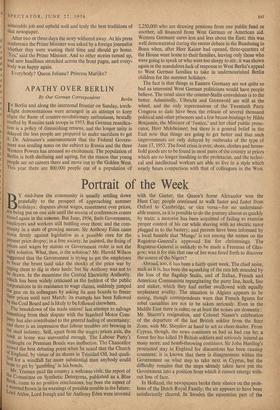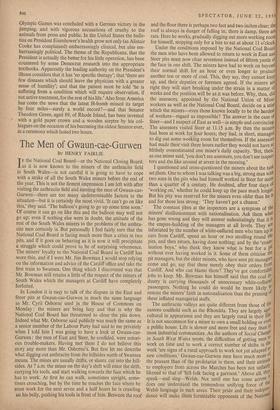Portrait of the Week
Y mid-June the community is usually settling down gratefully to the prospect of approaching summer holidays : disputes about wages, resentment over prices, are being put on one side until the season of conferences comes round again in the autumn. But June, 1956, finds Government, employers and workers still battling over them; and the com- 'nullity in a state of growing unease. Sir Anthony Eden came down firmly against legislation as a possible cure for the Present price dropsy; in a free society, he insisted, the fixing of Prices and wages by statute or Government order is not the right solution. What, then, is the solution? Mr. Harold Wilson suggested that the Government is trying to get the employers to bear the brunt (and take the shock) of the price war by ;l_rging them to dig in their heels; but Sir Anthony was not to be drawn. In the meantime the Central Electricity Authority, which has been widely criticised as the feeblest of the public `orporations in its resistance to wage claims, suddenly jumped the gun on its colleagues by asking its area boards to freeze Illeir prices until next March; its example has been followed by the Coal Board and is likely to be followed elsewhere.
The breakdown of the trade unions' last attempt to salvage something from their dispute with the Standard Motor Com- Pally has also contributed to the general feeling of uncertainty; and there is an impression that labour troubles are brewing in the steel industry. Still, apart from the wages/ prices axis, the l'eek at home was uneventful enough. The Labour Party's tIlislaught on Premium Bonds was ineffective. The Chancellor sQored the best debating point when he noted that the Church `,1f England, by virtue of its shares in Trinidad Oil, had quali- :ed for a windfall far more substantial than anybody could 11()Pe to get by 'gambling' in his bonds. Mr. Truman paid the country a welcome visit; the report of the Committee on Synthetic Detergents, published as a Blue '3, ocik, came to no positive conclusions, but bore the aspect of 4, worried frown in its warnings of possible trouble in the future; I-Ord Attlee, Lord Iveagh and Sir Anthony Eden were invested with the Garter; the Queen's horse Alexander won the Hunt Cup; people continued to walk faster and faster from Oxford to Cambridge, or vice versa—for no understand- able reason, as it is possible to do the journey almost as quickly by train; a motorist has been acquitted of failing to exercise proper control of his car while shaving with an electric razor plugged in to the battery; and parents have been informed by a local bumble that 'Mungo' is not among the names on the Registrar-General's approved list for christenings. The Registrar-General is unlikely to be made a Freeman of Glas- gow; was it for this that one of her sons fared forth to discover the source of the Nigers?
Abroad, too, it has been a fairly quiet week. The chief noise, such as it is, has been the squeaking of the rats left stranded by the loss of the flagship Stalin, and of Italian. French and American Communists regurgitating the party line, hook, line and sinker, which they had earlier swallowed with equally unpleasant avidity. The situation in Algiers appears to be easing, though correspondents warn that French figures for rebel casualties are not to be taken seriously. Even in the Middle East there is calm; or at least the noises are domestic : Mr. Sharett's resignation, and Colonel Nasser's celebration of the departure of the last British soldier from the Suez Zone, with Mr. Shepilov at hand to act as cheer-leader. From Cyprus, though, the news continues as bad as bad can be; a forest fire has killed 19 British soldiers and seriously injured as many more, and bomb-throwing continues. Sir John Harding's protracted stay in England for discussions has been causing comment; it is known that there is disagreement within the Government on what step to take next in Cyprus, but the difficulty remains that the steps already taken have put the Government into a position from which it cannot emerge with- out loss of face.
In Holland, the newspapers broke their silence on the prob- lems of the Dutch Royal Family; the air appears to have been satisfactorily cleared, In Sweden the equestrian part of the Olympic Games was concluded with a German victory in the jumping, and with vigorous accusations of cruelty to the animals from press and public. In the United States the bulle- tins on President Eisenhower's health grow not only (as Alistair Cooke has complained) embarrassingly clinical, but also em- barrassingly political. The theme of the Republicans, that the President is actually the better for his little operation, has been countered by some Democrat research into the appropriate textbooks. Apparently the leading authority on the President's illness considers that it has 'no specific therapy'; that 'there are few diseases which should leave the physician with a greater sense of humility'; and that the patient must be told 'he is suffering from a condition which will require observation, if not active treatment, for the rest of his life.' Also from America has come the news that the latest H-bomb missed its target by four miles—surely a world record?—and that Senator Theodore Green, aged 89, of Rhode Island, has been invested with a gold paper crown and a wooden sceptre by his col- leagues on the occasion of his becoming the oldest Senator ever, in a ceremony which lasted two hours.



































 Previous page
Previous page